
(This is what real diarrhea looks like)
One of the most common causes of diarrhea is intestinal upset is from food change.
A sudden change in the type of food, giving an unfamiliar treat, or feeding table scraps
stress of flying, can cause a bout of diarrhea.
NEW PUPPY DIARRHEA
NO TREATS !!!!!
People get their pups home and start treating and to our pups this is like giving
Candy to kids that have never had candy before, just think how kids are after halloween night !
Please do not give your puppy cooked bones ever, or treats for the first month !!!!
However a sudden bought of diarrhea is probably triggered by a reaction to vaccines.
Irritable or Inflammatory Bowel Disease can be immune mediated, secondary to 'vaccinosis'.
A chronic situation starting in puppyhood, is more often than not vaccine induced.
THIS MEANS NO MORE VACCINATIONS !!
and we have to build up that natural flora with RAW feeding and prebiotics and or probiotics
"Soft" stools can be normal when you get puppy home up to 2 weeks
This is because of stress, water change, change in routine, and treats or bones puppy has been given.
There is no need to rush to a vet because of loose stools. You will need to make sure puppy has plenty of water.
Stools should firm up within 2 weeks providing you don't keep changing diet, giving treats, changing environment.
When you bring a new young puppy home, they are under a ton of stress with such changes happening
They get taken away from their home. They get a new home.
This new pack is full of high energy, very exciting. They get fed new food
treats, new water and get a new bed and home.
When they receive a vaccine gotta think that we are "infecting" them
it is as if they are now fighting the flu on top of everything else.

I guess another way to look at it would be ...
when we humans travel to another country like Mexico for the first time,
your puppies body and mind will be under the same amount of stress
that our bodies would be experiencing.
New food, new fluids, new people, not knowing exactly what is what... so how are our stools that week ??
Now that is what might be happening when you get new puppy...
Now what should you do ?
NOTHING give the puppy time (up to 2 weeks) to adjust and do not give treats.
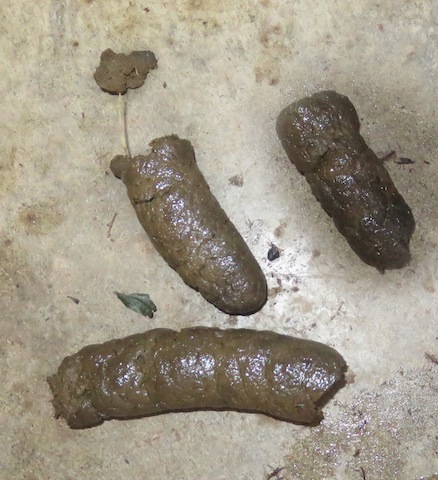
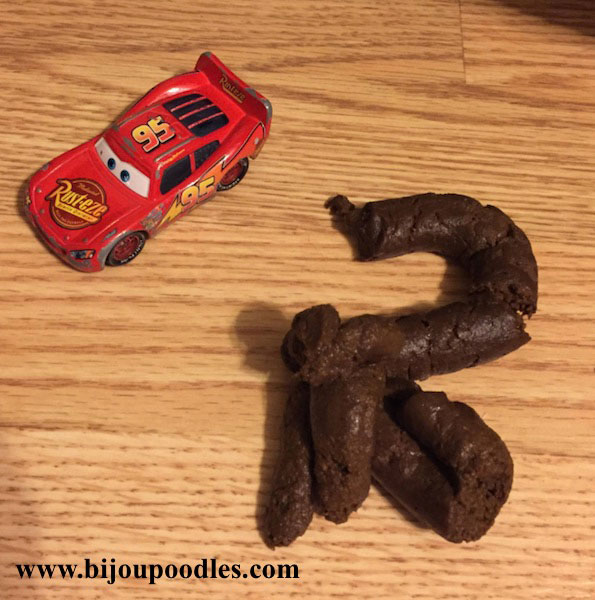
This is normal looking puppy poop
This puppy is 3 months old and on Nature's Domain Grain-Free Salmon Meal & Sweet Potato Dog Food from Costco
However a better choice would be Natural Balance venison and sweet potato ( including matching treats)
If you are going to feed kibble and not RAW
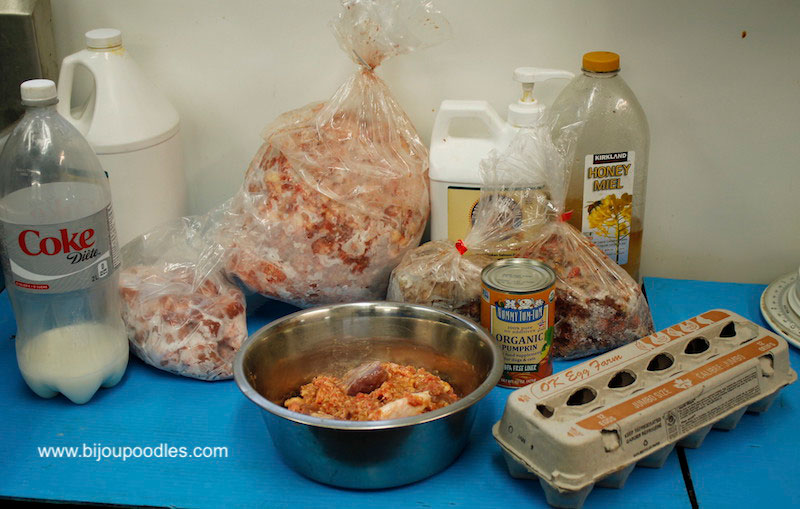
As of 2018 all our pups will be weaned onto RAW
Fine Ground whole chicken and RAW Goats milk
Eventually just the RAW chicken ground.

ADULT POODLE DIARRHEA:
Withholding food for 12 hours on an adult dog
will allow the dogs digestive system to settle down while having water 24/7 to them.
Give 100% pure canned pumpkin. This does not mean the pumpkin pie filling with sugars and spices.
Most dogs love the flavor of pumpkin, but it is a unique fiber that regulates the bowel.
1 tablespoon will suffice per morning meal. It will color the stool.
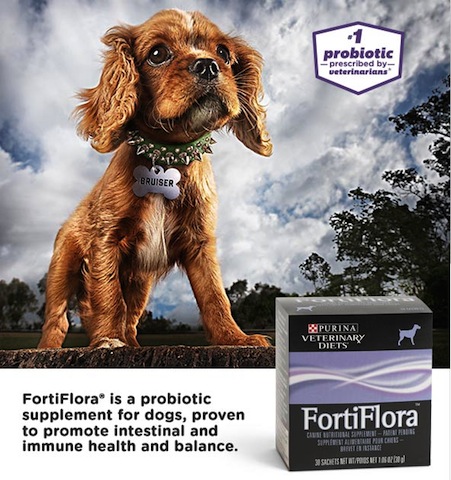
You could also choose to add a probiotic powder to the dog's water or softened food.
Refresh water dish (dump, wash bowl, refill) several times daily.
Diarrhea caused by food changes or water changes (ie to well water) stress can often be resolved at home,
so long as the diarrhea is not severe, and the dog/Puppy continues to act and feel normally.
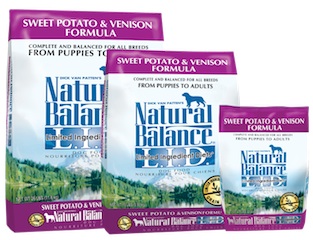
ALTERNATIVE TO WHAT WE FED YOUR PUPPY
Dick Van Pattens Natural Balance Venison and sweet potato
However for those that can afford it we highly recommend
Dick Van Patten's Natural Balance that has had great reviews and no bad reactions.
IF you switch to this food your puppy will have loose stools for a month.
None of the pups we keep have any issues.
I think this is just because we are so consistent in routine and food and no treats
and we have no stressors of travelling and put no toxins in our pups (flea/tick/heart worm/vaccines)
That being said, I would like to see a photo of what you are saying is diarrhea
just to make sure we are on the same page about that
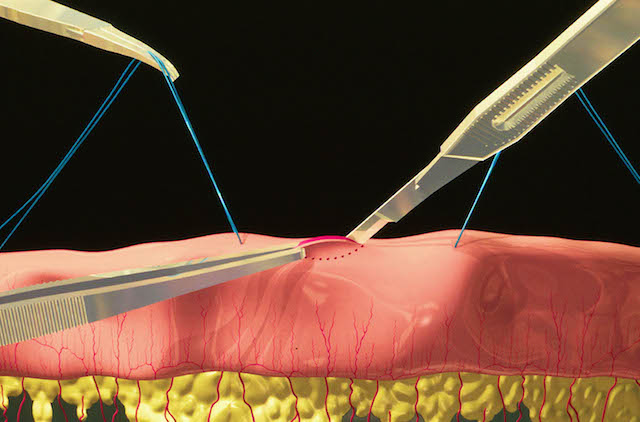
Vets love to dispense medications and put dogs on science diet
But in all fairness this is all they know and are taught, what to do.
That and doing bowel biopsy
Well anyone with half a brain, knows if you biopsy a bowel from a dog that is having diarrhea the
results will show irritation and inflammation of the bowel common sense NO BRAINER
I would not advise spending the money to find out what you already know
Another reason one of our pups might have diarrhea is Dysbiosis, or "leaky gut"
Especially if puppy has been on any antibiotics
This is a bacterial imbalance that leads to inflammation of the intestinal mucosa.
Antibiotics, other drugs including vaccines, highly processed diets (ie Kibble)
and stress all contribute to development of dysbiosis in pets.
Typical signs of a leaky gut include gas, bloating and diarrhea.
But dysbiosis can also cause or worsen a wide variety of other disorders and diseases.
In most cases, replacing a highly processed diet (ie Kibble) with balanced, RAW Diet
and adding appropriate pro and pre biotics, to address inflammation and support the organs of digestion
will relieve symptoms and resolve the root cause of the leaky gut.
As long as you know puppy does not have Coccidia (Coccidiosis) or Giardia infection (giardiasis)
Should puppy have either coddidia or Giardia, I have the cure, so let me know and I can help you.
Vets generally will only treat "symptoms", which is why these issues keep coming back
If puppy is clear of either of those, then we pretty much know diet should help clear up any GI issues.
Proper Diet and NO MORE VACCINES !!!!
and only use flea/tick pesticides on the dog if absolutely needed, because this all contributes to ill health.
This includes Hearth worm pesticide as well (and is usually not even needed).

Gastrointestinal upset will deplete the good bacterias in the digestive system
so we have to rebuild that with pre and probiotics. a pro biotic such as Purina probiotic
from your vet office, pet store, walmart or even on amazon to order it.
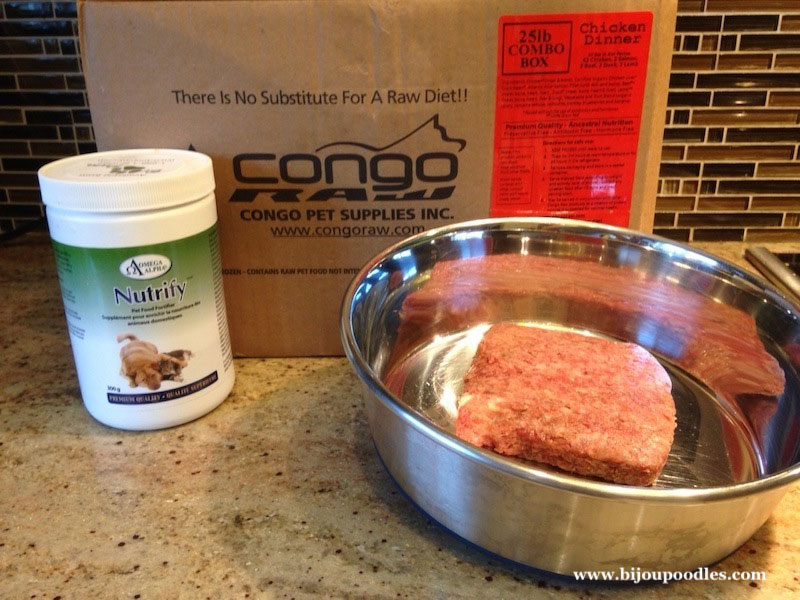
Any of our pups that have GI issues we encourage owners to put them on RAW diet.
we make our own, but you can buy some already packaged up and all ground which should
be an easier transition from processed kibble and easy to give 1 patties each morning
and one at night time. Such as Congo RAW, or Big Country Raw, but there are many others on the market.
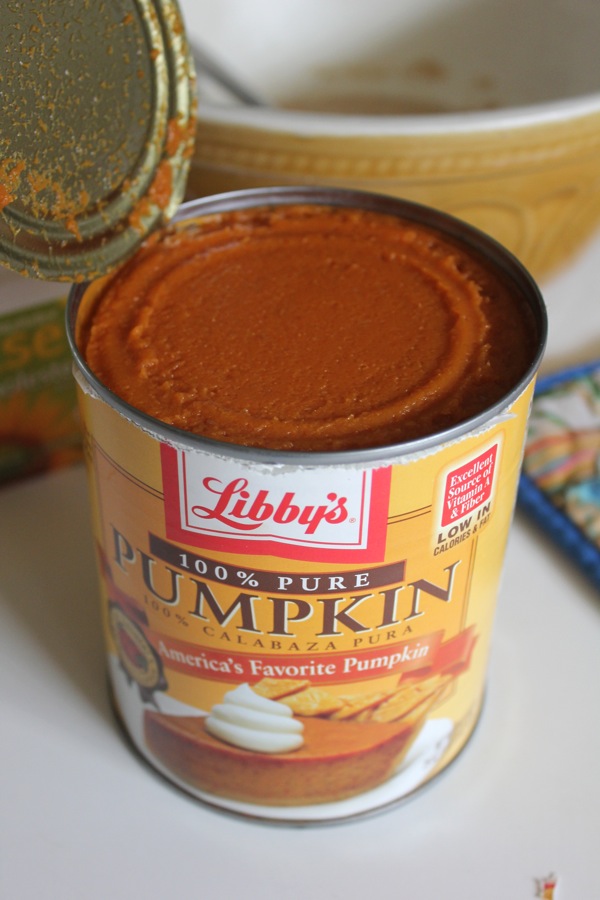
NO MORE PILLS.
Add a tablespoon of natural pumpkin every meal (not pie filling) can get at a pet store.
They also have powder but Im not sure of the dose for that. never used it.
RAW will help puppy build up their natural flora in their gut again
and give this 4 weeks to evaluate !!!! not over night or in a week.
Turkey is probably the best one to start on for the first few weeks.
Most bulk cases will have a mix... and this is said to be very good for dog's guts to mix up proteins.
IF I can't convince you to switch to a RAW natural diet, which should cure everything
THEN here is my next suggestion:
most dogs today can be sensitive to processing (ie kibble) but also to poultry (not RAW) and grains.
So start off eliminating kibble with poultry and grain,
I would have said Salmon and sweet potato however in 2018 I'm finding out
FISH has a ton of metals in it, which is causing havoc with our dog's health
The best of the kibble (if there is such a thing) would be one containing ingredients as much
from ground to mouth as possible, as natural as possible.

Chicken products from China causing intermittent vomiting and Diarrhea and killing dogs.
Glycerin in dehydrated jerky type treats, dehydrated Chicken Breasts, dog treats, greenies.
According to the FDA, they have found that dogs who consume varying amounts of Glycerin can exhibit the following symptoms:
decreased appetite, decreased activity, vomiting, diarrhea, increased water consumption urination.
With blood tests, the dog may have an increased BUN, Blood glucose which is evidence of glycerin's negative affects on the kidneys.
In hundreds of dogs kidney failure and death has been reported.
Fighting for Fido CBC Report
and the
FDA's link about chicken jerky treats and Glycerin.
SUSPECTED FOOD ALLERGY
Testimonials:


Ingredients: Fresh deboned wild boar, fresh deboned lamb, lamb meal, russet potato, fresh deboned pork,
In Spring of 2008, Jaeger, our German Shepherd became quite ill. He was only 14 months at the time and had us very worried.
To make a long story short, he lost close to 15 lbs. and the Vet insisted we try her canned food, just to get him to start eating again.
He was refusing everything else and It did do the trick, but, I had to start researching from scratch.
Nature's Variety frozen Lamb box of chubs that has 6 - 2lb chubs. The box is over $50.00 Economically we had to go with the chubs
He loved it and gained the weight back with no more upset stomach or diarreah.
Recently we discovered ORIJEN Regional Red kibble and give him that for breakfast and his lamb chub portion for dinner
which helps differ cost and He was digesting it well, no more diarrea or vomiting.
I hope you may share this with others if it will help them
Heather F.-G.

We switched to Dick Van Pattens Natural Balance Venison and sweet potato
( including matching treats) and a Purina probiotic FortiFlora the vet suggested at dinner
and a tablespoon of pumpkin at every meal for fiber. Malarkey has been perfect for a week.
He was immediately better as soon as we started on all this so I am confident we are on the right track.
The dog food has no grain in it, so I have no definite way of knowing if it was the chicken, the grain, or both,
but I don't care as long as we can relax about the diarrhea.
From: Kathy H.

I Don't know if I told you... I have transitioned Karat to raw feeding.
I feed 2 lbs of either rabbit, duck or bison a day plus 2 cups of chopped up veggie.
I get pre-made raw ground with about 5% bone in the mix from a local processor.
She gets organ meat twice a week. I add a digestive additive (mostly yogurt cultures) and a vitamin, enzyme mix.
Her stools are, for the first time, nice and firm and small.
Karat's Owners:

Dick Van Patten's Natural Balance - Dog Dry Alpha Grain-Free
Some people believe their Poodle might have allergies to grains or chicken
so you can try a food without either chicken or grains to see if this relieves symptoms of loose stools.
Beware that too much salmon in a diet can cause a struvite crystal problem with dogs.
Try to find a diet that is balanced but not too rich for our pup's digestive systems.
*Click here for more Food and Feeding information
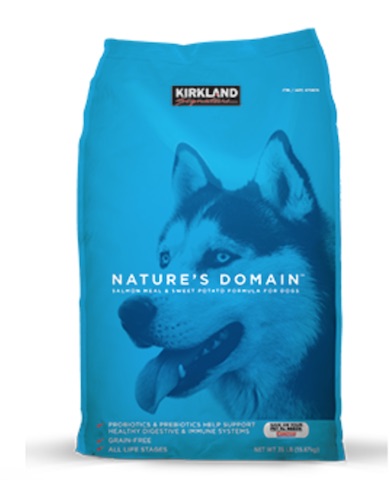 Nature's Domain Grain-Free Salmon Meal & Sweet Potato Dog Food
Nature's Domain Grain-Free Salmon Meal & Sweet Potato Dog Food
~ GRAIN FREE ~
Our local costco is now carrying this food and we were impressed with it after reading the ingredients.
We know that carotene and Copper proteinate may assist our dogs in keeping Red coat colour
and that this food is made with salmon meal and ocean fish meal for quality protein and is "grain free"
we decided to try our dogs and puppies on it in 2012 and found that our dogs lost weight so went back on Kirkland
In 2013 we switched to Nature's Domain Grain-Free Salmon Meal & Sweet Potato Dog Food, because our dogs were getting sick on kirkland
we will provide a review in 6 months time.
This food is ONLY available through Costco and is made by Diamond Pet Foods
(same company that makes Kirkland dog food)
*Click to read Ingredients
(Be aware that Blue Buffalo, Salmon foods have caused struvite crystals in dogs)
A lot of owners believe their dogs may have food allergies.
And in some breeds such as Irish Setters, there is a real disease called "Celiac disease" in which their dogs
cannot tolerate gluten, a protein present in wheat, barley and rye. Eating those grains causes an
abnormal immune response that attacks the small intestine. Irish Setters are the only breed known have to true celiac disease
but many dogs are sensitive to glutenous grains. This allergy can lead to skin problems, including hair loss, bumps or lesions,
itching and flaking, dry skin. The lesions usually show up on the dog's feet, head, neck, ears and stomach.
Other signs include secondary skin infections and chronic ear infections.
If you suspect a food sensitivity, check the labels on your dog's food for wheat or grain products.
You may have to change what you are feeding your dog. Dogs with food sensitivity can usually tolerate corn,
rice, gluten-free wheat, dairy foods and poultry. Several manufacturers make wheat and gluten-free dog foods and treats.
Of course some owners prefer to make their own RAW or BARF diets to avoid any problems
Testament from Karat's Owners:
Don't know if I told you... I have transitioned Karat to raw feeding.
I feed 2 lbs of either rabbit, duck or bison a day plus 2 cups of chopped up veggie.
I get pre-made raw ground with about 5% bone in the mix from a local processor.
She gets organ meat twice a week. I add a digestive additive (mostly yogurt cultures) and a vitamin, enzyme mix.
Her stools are, for the first time, nice and firm and small.
FOOD POISONING
 ...
...
*Click to read about Food Poisoning
We hope by providing you with this information that should your puppy have unexplained loose stools that you can begin treatment ASAP
Coccidiosis:
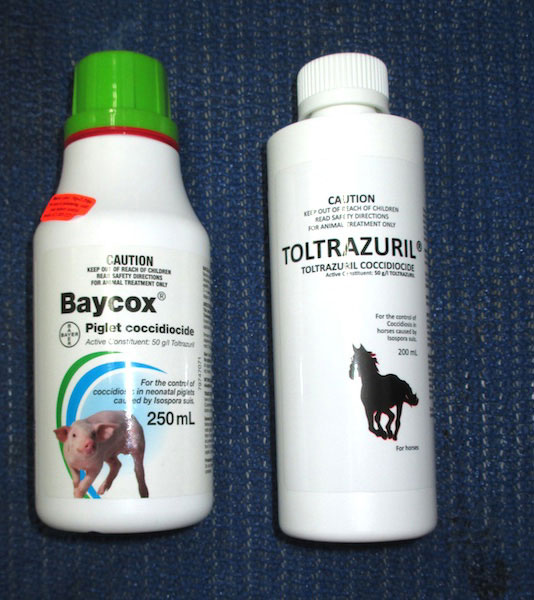
Baycox and Toltrazuril
Both Baycox and Toltrazuril kill coccidia and are newer drugs available as of 2013.
Toltrazuril is said to kill coccidia instead of just suppressing it
Information on Toltrazuril
Coccidia treatment information
We have both on hand, in case we purchase dogs with this or get exposed to this parasite.
Coccidia is found in 60% of dogs and is a very common protozoal infestation
that may rear their head on an otherwise healthy puppy if stressors of travel, change in living occur.
Coccidia clinical symptoms of diarrhea and is usually the main cause of loose stools in a puppy.
Treatment is 3 days or up to 14 days of oral liquid, powder or Pill medication that you can obtain over the counter or through the Vet.
We have included this information on Coccidiosis because we have had an incidence of our pups being diagnosed with Coccidiosis
in the past with pups getting it only after arriving to their new homes.
This was most puzzling to us, when we received a complaint, as the pups were healthy while in our care and Vet checked perfect.
We began doing fecal exams, testing the pups for Coccidia and still all tests came back negative while in our care.
After more research and consultation with a Vet, we discovered that exhisting parisites or even recent exposure,
may only be detectable when brought on, by the stressors of the new environment and or travel,
even while they have had no signs or symptoms prior to this.
Unfortunately our moms do roam our 1 acre property, go to dog shows and can be exposed to Coccidia
from eating critters such as mice, rabbits and even their feces if they were infected, despite our
best practices and our strict cleaning routines and also deworming regime.
Stool exam
If your puppy's loose stools persist we encourage you to "TREAT" for Coccidia.
WE DO NOT ADVISE SPENDING MONEY ON TESTING.
(Do consult with your Vet)
Reason I say this is because the testing can yeld a false negative. Treating a healthy uneffected puppy
with Antibiotics of: Metronidazole and Apo-Sulfatrim pills 2x a day for 7 days (at vet $22.00)
is not harmful and is more cost effective than continual ineffective testing and retesting.
Of course any bedding or contaminated areas must be cleaned with bleach as well
and the puppy washed if they have fecal matter on them to prevent reinfection.
This is not a pleasant infection to have to deal with and we hope that no one experiences this with their puppy, but it is treatable.

Trichuris vulpis, commonly known as whipworm does bring on the same symptoms as Addisons...
intermittent vomiting and Diarrhea, dysorexia, weakness, and weight loss.
infections are reported as causing hyponatremia and hyperkalemia and reduction of the cardiac silhouette
with fecal smears negative for whip worms.
Whipworms can cause acute, chronic, or intermittent diarrhea in dogs. Typically, the stool is mucoid and bloody.
The diarrhea is often accompanied by urgency and straining (Colitis).
Dogs with a heavy infestation may lose weight, fail to thrive, and develop anemia.
The syndrome mimics Addison's disease in every way except that testing for Addison's disease
is negative and deworming yields a complete recovery. In one documented treatment the dog was
treated with oral administration of milbemycine oxime (0.70 mg/kg bw; Interceptor Novartis AH)
and i.v. administration of 800 mL of saline solution (Na+Cla 0,9%) and discharged.
Read more on this here Pseudo-Addison Disease
Some topical treatments may kill whipworms, regular monthly doses of Interceptor or Sentinel are GUARANTEED
to wipe out the new adults at the time of each dosing but they can live up to 5 years in soil or grassy areas.
Giardia
Clinical signs range from none in asymptomatic carriers, to mild recurring diarrhea consisting of soft,
light-colored stools, to acute explosive diarrhea in severe cases. Other signs associated with giardiasis
are weight loss, listlessness, fatigue, mucus in the stool, and anorexia. These signs are also associated
with other diseases of the intestinal tract and are not specific to giardiasis.
Treatment is Metronidazole (brand name Flagyl).
More information located here:
Beagles Unlimited Information on Giardia
Clostridium
Clostridium is a bacterial infection that affects dogs and will manifest mainly through diarrhea.
There are 2 main types of clostridium bacteria that are more frequently met in dogs:
the clostridium perfringens and clostridium difficile. The infection is typically treated with a course of antibiotics.
Clostridium perfringens enterotoxicosis is a common cause of intermittent diarrhea in dogs and cats.
Veterinary practitioners should test for the enterotoxin whenever faced with a patient that has unexplained diarrhea.
More Information about Clostridium
Parvo Virus
In 24 years of breeding we have never had a puppy with Parvo Virus.
However, if your puppy has loose stools and if you bring a puppy with loose stools to "some" new vets
they may honestly believe they see Parvo OR they may just try to scare you with saying that the symptoms they see is Parvo Virus
because they know this will scare you into doing blood work $$ and other expensive treatments or investigations.
(which does not change any course of treatment by the way)
and will convince you to hospitalize your puppy when they tell you that puppies with parvo
are expected to die within 3-4 days of exposure to Parvo without professional care and hospitalization
What your vet may not tell you (or may not know) is that our pups should test positive for Parvo.
This is because we immunize for Parvo and the test will come back positive for Parvo "antibodies".
Same as tests in humans... Elisa test will do this, or snap tests which will usually only cost you $40.00 so
most people will think, "well I may as well do it". We also immunize using a "modified live" Parvo
all which can also yield a false positive.
So please make sure you tell your vet that in over 24 years of breeding your breeder has NEVER
purchased or produced pups with Parvo virus and our dogs are fully immunized and kept up to date.
Also make sure to inform your Vet that we do not contain our pups or dogs in a kennel or breeding facility
This is my Home and this is how our Mom's are kept.
I have heard of breeder's in the USA with barns full of poodles and breeding facilities full of Poodles
but this is not the case with us and this may help your Vet out.
You should be aware that the results of the blood work will also not change the course of treatment for ANY GI upset,
ALL GI upsets are treated the same, and all GI upsets on a healthy dog, will pass, with proper hydration and 1 week of antibiotic
totally up to you if you want to spend money on testing that will not change anything.
Treatment:
Antibiotics of: Metronidazole and Apo-Sulfatrim pills 2x a day for 7 days (at vet $22.00)
Having on hand or providing Hills a/d high nutrience tin food (at vet $3.00/tin)
B complex vitamins or Amino B complex liquid Vitamin 2x a day for 7 days
Clean all contaminated areas with bleach 1:32 (1/2 cup/gallon) concentration to be effective against
viruses and a parvocidal as long as there is no organic matter and surface contact time is 10+ minutes.

As of 2012 we have received this information on a newer treatment for Coccidia called Marquis (15% w/w ponazuril) Antiprotozoal Oral Paste by Bayer.
I have done more research and found the following links to support this "off label" treament:
The UC Davis Koret Shelter Medicine Program
Beagles Unlimited is the best resource
This is the most common dosage:
Dilute with water (10 ml ponazuril paste plus 20 ml water makes a 50 mg/ml suspension).
50 mg/kg PO once a day for 1-3 days
repeat in 7 days if needed
Ponazuril appears to be very safe.
Drs Foster Smith
Revival
Lamert Vet
Svp Meds compounding
California Pet Pharmacy
~ Click to read about "non-prescription" dewormers ~
Cryptosporidium
Cryptosporidiosis is caused by the Cryptosporidium parasite and both the disease and parasite are commonly referred to as "crypto."
The crypto parasite is found in every region of the United States and throughout the world.
Surveys indicate that up to 38.5% of cats and up to 44.8% of dogs are infected with Cryptosporidium.
Cryptosporidium species are coccidian-like protozoan parasites that infect a wide variety of vertebrate hosts.
Symptoms of cryptosporidiosis generally appear within an average of 7 days after becoming infected with the parasite.
The most common symptom is watery and persistent diarrhea, but others include: stomach cramps, nausea, vomiting, fever, weight loss and dehydration.
These symptoms will generally last 1-2 weeks (up to 4 weeks) in individuals with healthy and normally functioning immune systems.
Most puppies and dogs eventually fight it off and no longer have symptoms without treatment.
Medications can support the dog while fighting off the illness, but they don't actually cure it.
After becoming symptom-free, many dogs continue to test positive on blood tests because the test only shows
that they have at some time been exposed to the protozoan.
Others carry the organism, but don't show symptoms unless their immune system becomes compromised.
If your puppy becomes symptom-free, further tests and medication will no longer be needed, as puppy will just test "positive" to exposure.
Treatment:
Keep puppy calm and well hydrated and let it pass in 1-2 weeks as long as puppy is eating and drinking well.
Few drugs are consistently effective against Cryptosporidium.
The following drugs have been used with some success in cases
where animals have persistent diarrhea with oocyst shedding:
Paromomycin: 150 mg/kg SID for 5 days (dogs and cats)
Azithromycin: 5 to 10 mg/kg BID for 5 to 7 days (dogs)
Until recently nitazoxanide (Alinia) 2 was approved only for use in humans.
A regimen has been approved to treat adult animals:
100 mg BID for 5 days in animals 24 to 47 months old and 200 mg BID for 5 days in animals 4 to 11 years old.
The efficacy of nitazoxanide in dogs and cats is not known.

Amino B-Plex
Supplies patients with beneficial amounts of B complex vitamins, aqueous liver fractions
and essential amino acids in a highly palatable format that is easy to administer to small sized patients.
Might be helpful in puppy getting nutrience giving .5 of the dropper 2x a day















 Nature's Domain Grain-Free Salmon Meal & Sweet Potato Dog Food
Nature's Domain Grain-Free Salmon Meal & Sweet Potato Dog Food
 ...
...



